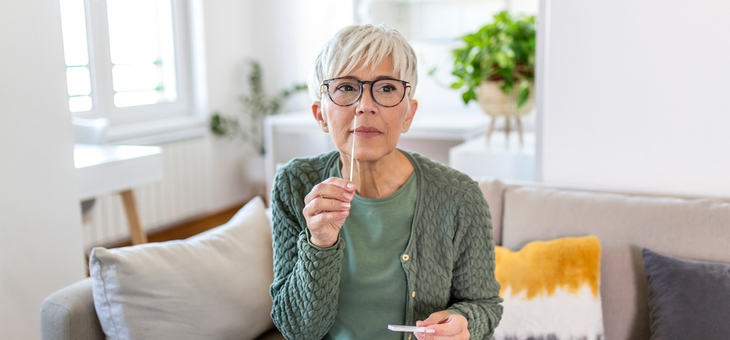Victoria lifted nearly all of its remaining COVID restrictions on Friday as the state rapidly approaches 90 per cent full vaccination for those aged 12 and over. It comes as a survey reveals that fear of infection from the virus is at an all-time high.
A survey of 3500 adults, conducted by the Australian National University (ANU), found that around two in every five thought they were likely or very likely to contract COVID-19 in the next six months.
The fear of infection is marginally higher than it was in the early days of the pandemic when 39.5 per cent of Australians were worried about being infected in April 2020.
Read: The diabetes treatment that can fight COVID
The fears come as Victoria reported 1273 new COVID cases and eight deaths, while NSW reported 216 news cases and three deaths in the latest reporting period.
ANU study co-author Professor Nicholas Biddle said that fears of infection were four times higher than they were in April 2021.
“In April 2021, around one-in-10 Australians, 10.7 per cent, were worried they would get infected by COVID-19,” Prof. Biddle said. “Now, 40 per cent of us think the same.
Read: Understanding how anti-vaxxers feel
“This is a huge jump and shows that even though the vast majority of adult Australians are getting vaccinated against COVID-19, many of us think it is inevitable we will get the disease at some point in time, especially as the country opens up more and more.”
As part of the Victorian changes that took place on Friday morning, there are no longer density limits for cafes, bars, restaurants or any other retail or hospitality setting.
The mask mandate is no longer required for customers visiting hospitality settings, but workers must continue wearing them.
The Victorian changes on Friday also mean that there are more restrictions on what the unvaccinated can do.
Unless they have an exemption, unvaccinated Victorians are banned from non-essential retail, with debate brewing between the federal government and the states about what the unvaccinated should be allowed to do.
Prime Minister Scott Morrison came under fire on Thursday for suggesting that unvaccinated people in Brisbane should be able to get a cup of coffee and that the state governments should be stepping back from interfering in people’s lives.
Read: Should the unvaccinated pay for their own COVID care?
Defence minister Peter Dutton defended the Prime Minister’s comments on the Today show on Friday morning.
“I think the Prime Minister has made a perfectly sensible remark there,” Mr Dutton said. “I just think you can’t segregate a part of the community, even if you disagree with the decision they have made.”
Victorian Premier Dan Andrews put the blame for state governments having to get involved in people’s lives for so long squarely back on the federal government.
“He (Morrison) is right to say that we have been in people’s lives,” Mr Andrews said on an appearance on Sunrise on Friday morning.
“Why did we have lockdowns? Because we did not have a vaccine. Who forgot to order the vaccine? It wasn’t state premiers,” Mr Andrews said.
“It is a bit rich from the prime minister from Sydney and all too often for Sydney to be lecturing people about freedom.
“We have done the hard yards because there was not a vaccine. If there had been a vaccine earlier, when the virus came from Sydney this year, we would not have had needed to lockdown.”
One of the worrying trends in the ANU study, according to Prof. Biddle was the increase in the number of Australians saying they were experiencing ‘severe’ psychological distress.
“We’ve been tracking the impact of COVID-19 across Australian society for almost two years now,” Prof. Biddle said. “This is the highest level of severe psychological distress we’ve seen yet.
“In October, 12.5 per cent of Australians said they are experiencing severe mental stress. This is compared to a previous high of 10.6 per cent in April 2020.”
Study co-author Professor Matthew Gray said there was also “good news” from the latest survey, with fewer Australians saying they felt they were facing major financial stress.
“We found that in October 2021, 21.4 per cent of Australians didn’t think they could get by on their current income, compared to 22.6 per cent in August 2021 and 23.2 per cent in April 2021,” Prof. Gray said.
“We also found that household incomes continue to increase. In February 2020, we estimated average income to be $1795 per week. By April 2020 this had fallen to $1632, a fall of 9.1 per cent.
“By October 2021, average household income was $1701 per week. So, while not quite at their pre-pandemic levels, it would appear that how much Australians are earning each week is less of a pressure than what it was in the middle of the pandemic and lockdowns.”
Are you fearful of catching a COVID-19 infection? What is your opinion on what the unvaccinated should be allowed to do across Australia? Why not share your thoughts in the comments section below?
If you enjoy our content, don’t keep it to yourself. Share our free eNews with your friends and encourage them to sign up.

